The leaked draft opinion revealing that the U.S. Supreme Court intends to strike down pivotal abortion rights case Roe v. Wade was denounced widely by local and state officials this week—Gov. Gavin Newsom said he wants to enshrine the right to an abortion in California’s Constitution—and sparked fear among some that other civil rights were at risk.
“They won’t stop at Roe. They’re coming for LGBTQ people. They’ll stop at nothing to make us second-class citizens & push us back into the shadows,” State Sen. Scott Wiener tweeted.
Newsom wrote in a statement that, “This draft opinion is an appalling attack on the rights of women across this country and if it stands, it will destroy lives and put countless women in danger,”
City politicians, including newly minted Assemblymember Matt Haney, Supervisor Dean Preston and Supervisor Hillary Ronen, also weighed in, as did Sen. Alex Padilla, and Rep. Jackie Speier. “I am apoplectic about what this leaked SCOTUS decision will do to a generation of women in this country,” Speier wrote.
The Supreme Court’s draft opinion, leaked to Politico on Monday, is an initial version of a majority opinion written by Alito. The Supreme Court confirmed the legitimacy of the draft on Tuesday morning.
Calling Roe “egregiously wrong from the start,” Alito’s opinion would undo half a century of precedent, allowing each state to decide the matter independently.
“It held that the abortion right, which is not mentioned in the Constitution, is part of a right to privacy, which is also not in the Constitution,”the justice wrote of the case.
But a reading of the full opinion text reveals a hammer blow to the concept of privacy itself, something that has been at the heart of American jurisprudence for decades. Noreen Farrell, civil rights attorney and executive director of Equal Rights Advocates in San Francisco, said that by Alito’s logic, LGBTQ+ rights, voting rights and even married couples’ ability to use contraception may now face a full-frontal assault.
“There are other fundamental constitutional rights, protected currently by the right of privacy, that are being tangled with by the language of this decision,” said Farrell.
Alito’s draft explicitly criticizes privacy right based cases in a way that is very concerning, Farrell said. She points to the fact that Alito referenced landmark cases like Lawrence v. Texas (2003), which prevented the criminal prosecution of gay sexual relationships, as well as Obergefell v. Hodges (2015), which legalized same-sex marriage nationwide on privacy grounds.
While Supreme Court justices can, and sometimes do, change their opinions after drafts are written, Politico cites an anonymous source that claims four other justices voted with Alito in a preliminary hearing in December. The court is expected to vote on the case that prompted the opinion, the state of Mississippi’s attempt to ban most abortions after 15 weeks of pregnancy, in the coming months.
Groups across the Bay Area mobilized Tuesday, and there was a rally in San Francisco organized by National Mobilization for Reproductive Justice.
On Wednesday, Mission eatery and events space Manny’s will host a community gathering and discussion with attorneys Anjali Srinivasan and Luis Hoyos, who will explain the draft opinion and how it might affect future legal battles. The civics-focused cafe will follow up on that forum with a panel of political, activist and medical experts discussing what a post-Roe world might look like on May 9.
The national Women’s March also encouraged groups to rally nationwide against the potential decision. The local San Francisco chapter of Democratic Socialists of America also tweeted that it plans to mobilize and support mutual aid efforts.
Correction: An earlier version of this story misstated the status of the case. A final vote is expected in the coming months.
